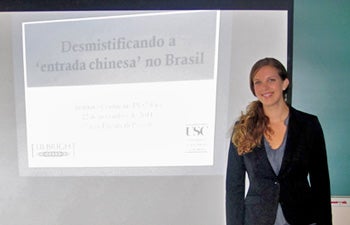Brazil Should Welcome Chinese Investors, USC Dornsife Fulbright Fellow Says
On a humid August day in Rio de Janeiro, USC Dornsife alumna Dawn Powell boarded an un-air-conditioned bus bound for Luís Eduardo Magalhães, an agribusiness town in western Bahia. An hour into the trip, the Fulbright scholar stood on the roadside in heels and business casual attire watching the bus driver patiently negotiate with a group of protesters blocking the road.
Knowing she would now be late for her appointment with government officials, the San Diego, Calif., native took a deep breath and did what Brazilians would do in this situation — she practiced the jeitinho, a street-smart method of social navigation that comes from a Brazilian expression meaning “find a way.” It means using one’s charms to circumvent an obstacle. Powell calmly called the government official who was waiting for her and in fluent Portuguese asked to push back their meeting. He agreed.

USC Dornsife alumna Dawn Powell learned how to go with the flow when her bus ride from Rio de Janeiro to western Bahia was interrupted by a Brazilian Landless Movement protest. Photo courtesy of Dawn Powell.
“I used to get stressed out and then I observed how the Brazilians don’t yell, they don’t get upset, they just smile and talk their way through difficult situations,” said Powell who graduated from USC Dornsife in 2010 with a bachelor’s in international relations and minor in Spanish.
The interview was part of Powell’s year-long investigation into how Sino-Brazilian economic relations affect Brazil’s development. Using information gleaned from interviews with economists, academic and trade experts, researching scholarly publications and Brazilian newspapers, attending conferences on the topic, and talking to people in the community, Powell concludes that Brazil must re-examine its current views toward China.
“Brazil is blaming China for Brazil’s own problems on competiveness, which isn’t going to get them anywhere,” said Powell, who hopes to have her findings published by next year.
“Brazil needs to learn how to adapt to its changing global economic environment. Brazil has many problems such as a weak infrastructure, and the cost of doing business here is very high. The country would be better off trying to chip away at its own problems and doing a self-evaluation rather than putting up protectionist barriers against China.”
In 2009, China surpassed the United States as Brazil’s largest trading partner, a position the United States had held since the 1930s. As the Brazilian economy continues to expand, trade between the largest South American economy and China has increased by 58 percent since 2009, bringing the total flow of commerce between the two nations to $56 billion in 2010, according to the BBC.
Tensions in Brazil have grown in recent years over this new relationship. As Chinese-made consumer goods flood the Brazilian market at growing levels, Brazil’s exports to China remain overwhelmingly comprised of commodities. The increase in consumer goods imports from China preventing the creation of 46,000 manufacturing jobs in Brazil is one major concern, according to the Center for Strategic and International Studies, a bipartisan, nonprofit organization headquartered in Washington, D.C.
Powell has concluded that domestic interest groups in Brazil are pressuring the Brazilian government to embrace a more protectionist policy towards China. This decline in the Sino-Brazilian relationship is problematic because Brazil must leverage opportunities extended by Chinese investment and trade relations to further its own development. Based in Rio de Janeiro, Powell’s Fulbright year ends Nov. 30.

On the final day of her Fulbright year in Brazil, USC Dornsife alumna Dawn Powell presents her final findings at the Confucius Institute at the Catholic University, PUC-Rio. Photo courtesy of Dawn Powell.
“Dawn is absolutely flourishing as a Fulbright,” said Carol Wise, associate professor of international relations, who traveled to Brazil in June 2011 jointly interviewing top economists and former ambassadors with Powell. “She is on her own and doing really well in terms of developing her own research style and skills.”
In October, Powell’s case study about Chinese investments in the Brazilian soy industry was published online in the Financial Times. She wrote the article after interviewing Chinese soy investors in Barreiras, a city located in the western region of the state of Bahia. Many Brazilian news outlets publish stories about China’s move to buy farmland in Brazil to grow soybeans and maize, but Powell was the first researcher to actually visit the site of the soy complex proposed by Chinese investors, those she interviewed told her.
“Visiting the soy complex site was very important for my research,” Powell said. “I found out so many interesting details about the roadblocks the Chinese encounter when trying to invest in Brazil. However, I learned that on a state level, Brazil is trying to attract investments from China, which presents a sharp contrast to the fear of Chinese competition on a national level.”
After interviewing Jairo Vaz, Bahia’s superintendent of agribusiness who is based in Salvador, Powell learned of the state’s interest in attracting investments from China by giving China the land for a soy oil processing plant. The mayor of Barreiras negotiated with a local landowner and business to donate the land required for the construction of the plant, according to Powell.
Powell also interviewed businesspeople, trade experts in the region and community members to get their opinions on the China-Brazil trade and investment policy.
She notes that in August 2010 Brazil signed off on changes to its trade and investment law to make it harder for foreigners to buy farmland in Brazil. But the changes scared away U.S. and European investors in cellulose and agribusiness that Brazil now says it wants to attract, Powell said.
Another change to the law under discussion would specifically ban Chinese investors from buying any land in Brazil, which could have negative consequences for China-Brazil relations, Powell said.
Post-Fulbright, Powell plans to return to Rio to begin work at a private equity firm. She hopes her hands-on international business experience will prepare her to pursue a graduate degree in business and eventually work in microfinance, international development or social enterprise.
“I definitely want to make a difference, but I want to do it in a smart kind of way,” Powell said. “Hopefully with some business acumen I’ll be able to create social change on a greater scale and in a sustainable way.”